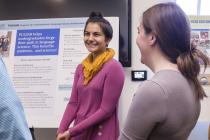Linguistics
Stream on Facebook: https://bit.ly/3DgBJwB
Stream on YouTube: https://youtu.be/3yQLqGtkHRM
Online regularities and prior knowledge conspire to shape speech perception
Nataliya Stepanova -- a Math and CS double degree student and Linguistics minor, and an alum of LSC’s PULSAR undergraduate research program -- has become the University’s sixth (ever) recipient of a Marshall Scholarship. Pandemic permitting, she will be heading to Scotland in the Fall to earn a Master’s in Speech and Language Processing at the University of Edinburgh.
Degreefulness is the result of functional inventory, not a parameter
(joint work with Margit Bowler, Emily Hanink and Andrew Koontz-Garboden, University of Manchester)
Precise meanings and loose concepts: Roles for underdetermination and imprecision in formal semantics
A new way to find developmentally meaningful variation in children's input: A look at syntactic knowledge across socio-economic status
Documenting topic and focus
This talk, you should attend (to understand this sentence).
Judith Aissen (UC Santa Cruz) will give a talk on information structure. The talk is officially part of Masha Polinsky's class, but everyone is welcome and encouraged to attend.
In this week's meeting of the Cognitive Neuroscience of Language (CNL) Lab, Hanna Muller (LING) will be leading a discussion on what is meant by "shallow processing".
If you'd like to join this discussion and/or the CNL Lab email list, contact Colin Phillips (colin@umd.edu).
Do children know WHanything? Acquisition of Mandarin wh-indefinites
Abstract: Unlike English wh-words like “what”, Mandarin wh-words have both an interrogative and an indefinite interpretation, as shown in (1).
(1) Xiaoxiao mei chi shenme.
Xiaoxiao NEG eat what
a. Interrogative: What didn’t Xiaoxiao eat?
b. Indefinite: Xiaoxiao didn’t eat anything/much.









